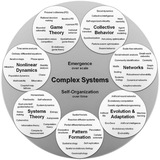group-telegram.com/ComplexSys/5782
Last Update:
From classical to modern opinion dynamics
Hossein Noorazar, Kevin R. Vixie, Arghavan Talebanpour, Yunfeng Hu
In this age of Facebook, Instagram and Twitter, there is rapidly growing interest in understanding network-enabled opinion dynamics in large groups of autonomous agents. The phenomena of opinion polarization, the spread of propaganda and fake news, and the manipulation of sentiment are of interest to large numbers of organizations and people, some of whom are resource rich. Whether it is the more nefarious players such as foreign governments that are attempting to sway elections or large corporations that are trying to bend sentiment -- often quite surreptitiously, or it is more open and above board, like researchers that want to spread the news of some finding or some business interest that wants to make a large group of people aware of genuinely helpful innovations that they are marketing, what is at stake is often significant. In this paper we review many of the classical, and some of the new, social interaction models aimed at understanding opinion dynamics. While the first papers studying opinion dynamics appeared over 60 years ago, there is still a great deal of room for innovation and exploration. We believe that the political climate and the extraordinary (even unprecedented) events in the sphere of politics in the last few years will inspire new interest and new ideas. It is our aim to help those interested researchers understand what has already been explored in a significant portion of the field of opinion dynamics. We believe that in doing this, it will become clear that there is still much to be done.
https://arxiv.org/abs/1909.12089
BY Complex Systems Studies

Share with your friend now:
group-telegram.com/ComplexSys/5782
